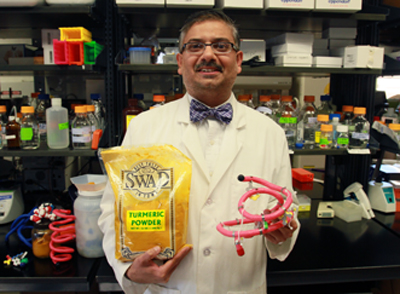By Nadia M. Whitehead
UTEP News Service
More than 5 million Americans are living with Alzheimer’s disease, while studies reveal that India has one-sixth that rate; one of the lowest rates of the disease in the world.

Why? The answer may lie within their diet.
“Turmeric – the widely-used yellow Indian spice – is good for flavor, color, and the brain,” said Mahesh Narayan, Ph.D., associate professor and assistant chair of chemistry at The University of Texas at El Paso.
Since the Alzheimer’s statistics were released, the biochemist has been focused on understanding – at the molecular level – the neuroprotective capabilities of curcumin, a polyphenol within the turmeric spice, as well as pinpointing other polyphenols that are structurally similar, including ellagic acid – found within almond oil – and masoprocol within the local desert creosote bush.
Along with doctoral candidates Parijat Kabiraj and Emanuel Zubia, and a host of undergraduate researchers, Narayan has been testing the ability of the polyphenols to prevent the sporadic onset of Alzheimer’s and Parkinson’s disease, which is caused by the misfolding of proteins.
“While protein folding is of fundamental importance, it is protein misfolding that is responsible for several diseases, including the onset of neurodegeneration,” he said.
Protein misfolding can occur when free radicals attack during the folding process and permanently disfigure the structure.
“From the time of birth, free radicals are a part of everyone, and can lead to misfolding,” Narayan said. “But as we age, it appears that our cellular ‘housekeeping’ machinery, whose job it is to clean up misfolded debris, can no longer keep up.”
As a result, this can cause the accumulation of amyloid fibrils and plaques that ultimately impact neurotransmission and cause neurodegeneration.
“One then may present the well-known symptoms of Alzheimer’s or Parkinson’s such as memory loss, inability to coherently process information, impaired gait, tremors and uncontrollable movements,” he said.
However, supported by funding from the Alzheimer’s Disease Research Foundation, Narayan’s lab has demonstrated that select polyphenols have the capability to intervene in the misfolding process by scavenging the free radicals before they latch on and disfigure proteins.
With the help of Manuel Miranda-Arango, Ph.D., assistant professor of biological sciences, and postdoctoral researcher Armando Varela, Ph.D., experiments in human neuronal cell lines have shown that curcumin mitigates the accumulation of a key biomarker in Parkinson’s disease, and the same studies are underway using masoprocol and ellagic acid, which Narayan anticipates will demonstrate similar results.
These same polyphenols are also being tested in cell lines programmed to model Alzheimer’s, where they will hopefully intervene in the accumulation of Alzheimer’s biomarkers as well.
“We’d like to chemically define the compounds inside these substances to learn what’s involved in the curing or prevention of the diseases,” Miranda-Arango said.
Narayan agreed.
“Traditionally, your grandmother, or even your old man, might have told you to eat, for example, chicken soup because it’s good for a cough and cold,” Narayan said. “But at the molecular level, is it really doing something or is it just a placebo effect? Our lab is interested in finding out at the molecular level – does it really work, and if so, how?”
The protein folding expert and biophysicist now plans to translate his findings into an animal model with the help of Miranda-Arango and Edward Castaneda, Ph.D., chair and professor of psychology. Together, they will evaluate the efficiency of the polyphenols in restoring behavioral and biochemical deficits associated with the two neurodegenerative diseases.
Ultimately, Narayan hopes to collaborate with food manufacturers and have curcumin, or other nueroprotectants, laced in potato chips or milk to “innocuously inoculate” the public from the sporadic onset of Alzheimer’s and Parkinson’s disease.
“Every time we eat, our cells produce these free radicals,” Miranda-Arango said. “Now you can have a molecule that will scavenge these and prevent the diseases. It’s a good idea and I think companies will buy it. It may take a long time, but many drugs are out on the market that started at this level of research.”
